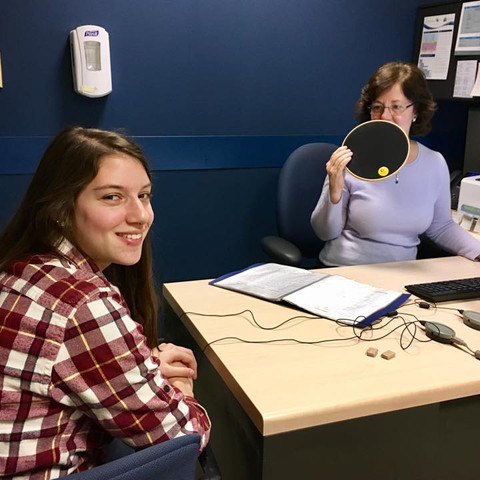Sound of Metal: Setting the Record Straight
- summitfilm
- Apr 19, 2021
- 3 min read
Lisa Reznik, Program Director, Film Society of Summit
Donna Sorkin, Executive Director, American Cochlear Implant Alliance
April 19, 2021
Friends who know that my daughter, Miranda Meyers, has two cochlear implants, have asked me about my reaction to the new film Sound of Metal which portrays a heavy metal drummer whose world begins to unravel as he starts to lose his hearing.pI agree that Riz Ahmad who plays the lead character Ruben is outstanding; it’s gut-wrenching to watch him go through the experience of being a drummer and suddenly lose his hearing. This portrayal is further amplified by his status as a heavy metal musician and former drug addict.
But there is so much that is factually wrong with this film in terms of the cochlear implant process. Given the meticulous research that the director notes in interviews, one has to wonder why the filmmaker chose to insert so much misinformation into the story.
At the initial audiology meeting, Ruben is told that cochlear implants cost between $40,000-$80,000 and health insurance doesn’t cover this expense. That is false—cochlear implantation is covered by Medicare, Medicaid and the vast majority of private insurances. Ruben’s surgical scars were characterized by one surgeon as “comical.” The J-shaped incisions on Ruben’s head have not been used since the 1980s and were never that large. Most scars from cochlear implant surgery with a one-inch incision are not visible, b/c hair covers the scar.
To set the record straight, it’s inconceivable that any cochlear implant (CI) program would proceed without a meticulous evaluation of a patient—particularly one who experienced sudden hearing loss. For every patient, a medical and audiological evaluation is conducted. The process is thorough and empathetic. Patients are counseled on what to expect during the early weeks and even months as their brain learns to interpret the new signal as meaningful sound. Someone like Ruben who experienced sudden hearing loss and is implanted quickly would likely have a positive outcome but it does take time. That aspect of the process is entirely missing.
The cochlear implant audiologist is portrayed in a most negative manner with no counseling and no long-term expectations provided, nor discussion of the need for support. Ruben is sent on his way as if he has completed a transaction; this is not anything like the actual process.
Some CI recipients who watched the film mentioned that they identified with the perception of weird new CI hearing on the day of Ruben’s activation—not uncommon among recipients during that early part of the process. Of note was how quickly Ruben was able to communicate orally soon after activation of his cochlear implants when he travels to France to reconnect with his girlfriend. This after a total inability, prior to the CI, to understand speech. Such a rapid outcome is remarkable but is not unique.
My reaction to the inaccuracies come from my experience as a parent of a deaf child, as an advocate for hearing and spoken language for deaf children, and as a filmmaker. In 2013, I wrote and directed the short dramatic film 95 Decibels about our family’s experience facing the responsibility of choosing the method of communication for our young child. The primary goal in making this film was to represent our decision of a cochlear implant for Miranda, rather than ASL, and the outcome, honestly. In writing the script, I sought advice from professionals to represent the specific issues, including the rehabilitation, accurately. I have neither witnessed nor heard about a cochlear implant activation that looks like the one portrayed in the film. Everything about this film is designed to cast a negative light on cochlear implantation--an extraordinary intervention that restores a sense and provides access to sound for adults (who lost their hearing or never had it) and for many children for the first time. My daughter’s life and that of our family has been a story of astonishing benefit—indeed a benefit that my husband and I never dreamed would be possible. How unfortunate that a film on deafness that portrays so sensitively what it’s like to lose one’s hearing should be so negative about the prospects for hearing restoration.
Miranda is now 24, a graduate of Summit High School and Rochester Institute of Technology. She works in politics in New Jersey and frequently speaks to groups about her experience, as well as to patients considering a cochlear implant.






































Comments